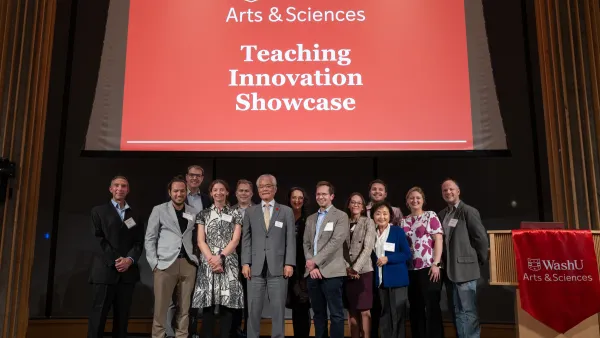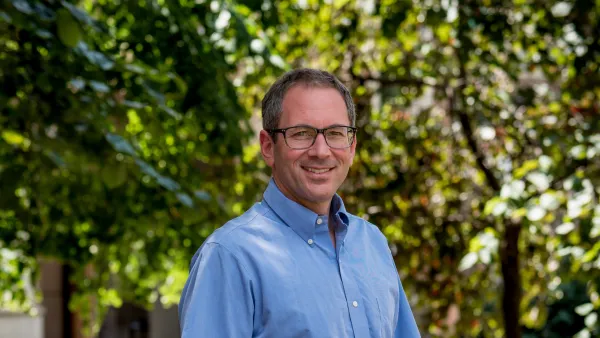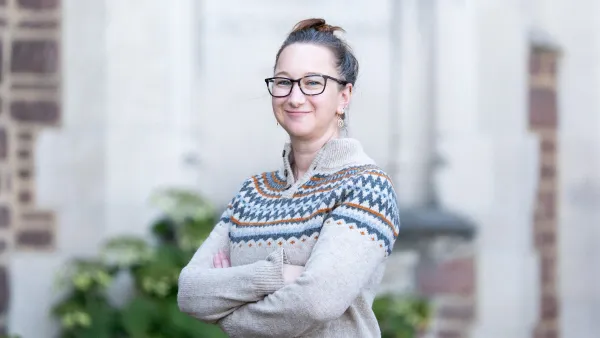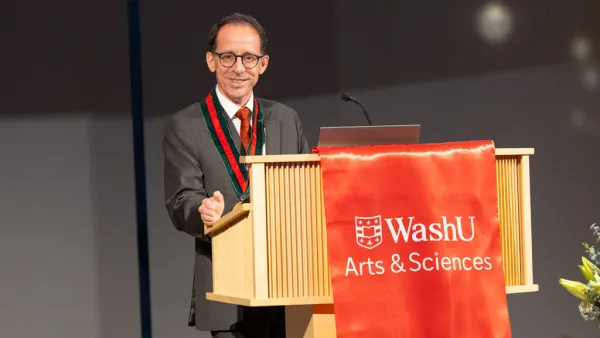Undergraduate students:
Sophia Dutton, a neuroscience track and Japanese double major in the School of Arts & Sciences and a member of the Class of 2023, was honored with the 2022 Gerry and Bob Virgil Ethic of Service Award, which recognizes a select group of WashU community members who exemplify a character of service and engagement with the St. Louis region. As co-president of Heart for the Unhoused (HU), a student-run nonprofit that works to increase healthcare access for unhoused populations in St. Louis, Sophia worked to improve training for members by increasing education related to issues of systemic racism and intersectionality. She worked directly with community members to gain a better understanding of St. Louis healthcare disparities and how Washington University students could help to reduce them. She has also dedicated herself to learning more about mental health resources in St. Louis, among many other issues related to access to care.
Ethan Lowder, a biochemistry track major in the School of Arts & Sciences and a December 2021 graduate, has been awarded the 2022 Ralph S. Quatrano Prize. The Quatrano Prize is awarded to the thesis showing greatest evidence of creativity in design, research methodology or broader scientific implications. Lowder was nominated by his major advisor and Bio 500 independent research mentor Robert Kranz for his thesis titled, “Cryo-EM structures of CcsBA elucidate cytochrome c biogenesis and heme transport.”
Ephraim Oyetunji, a neuroscience track major in the School of Arts & Sciences and member of the Class of 2023, received the Barry Goldwater Scholarship, a prestigious award that honors students who conduct research in the natural sciences, mathematics and engineering. Oyetunji plans to conduct translational research on neurodegenerative diseases such as Alzheimer’s disease, Parkinson’s disease and frontotemporal dementia and works in the Miller lab at the School of Medicine.
Gaby Smith, a biochemistry track major in the School of Arts & Sciences and a member of the Class of 2022, received the 2022 Harriet K. Switzer Leadership Award from the Women’s Society of Washington University. Smith was nominated for this award by one of her mentors, Joe Jez, for her significant contribution to WashU during her undergraduate years and her demonstrated exceptional potential for future leadership. Smith worked in the Lavine lab at the medical school on a research project exploring interferon signaling in cardiac disease, served as a peer-led team learning group leader for our introductory Biology course sequence, volunteered for the Einstein Explorers program at the Campus YMCA (which brings fun science experiments to young patients at Children's Hospital), served on the Student Union Senate (as a past speaker of the senate and senator), performed clinical research through our Pediatric Emergency Medicine Research Assistant Program (PEMRAP), and served as one of two undergraduate student representatives to the Board of Trustees of Washington University.
Xinyang (Loen) Su, a senior majoring in biochemistry, won the American Chemical Society Analytical Award for his work in Haijun Liu's lab where he spent 3 years probing the molecular mechanism of photoprotection in cyanobacteria and higher plants. He will be pursuing his PhD at UC Berkeley working on protein structure and function.
Madhav Subramanian, a biology major in the School of Arts & Sciences and member of the Class of 2023, received the Barry Goldwater Scholarship, a prestigious award that honors students who conduct research in the natural sciences, mathematics and engineering. Subramanian, a Florence Moog Scholar, plans to study cancer biology with a focus on tumor immunology and is a research assistant in the Choi lab at the School of Medicine.
Kayla Wallace, an environmental biology major, minoring in anthropology, in the School of Arts & Sciences, has been awarded the 2022 Spector Prize from the Department of Biology. The award recognizes academic excellence and outstanding undergraduate achievement in research. Wallace was nominated by her faculty mentor Joan Strassmann. Wallace’s thesis, titled “Effects of freshwater acidification and parasitism upon rusty crayfish consumption behaviors” was praised by all who read it for the design of the experiments, the technical excellence with which they were carried out, and the incisiveness of interpretation of the results. Honorable mentions for the Spector Prize include Onyi Onyeador for her work in Todd Fehniger’s lab, Rachel Silverstein for her work in Indira Mysorekar’s lab, and Victoria Chen for her work in Joseph Dougherty’s lab.
Graduate students:
Ethan Abercrombie, a second-year PhD candidate in the Evolution, Ecology and Population Biology program, received an NSF GRFP Award. Abercrombie is working on his thesis in Jonathan Myers’ lab and is broadly interested in tropical and canopy ecology, the assembly of diverse vascular-epiphyte communities, and the ecological consequences of arboreality.
Anna Damato, a fifth-year PhD candidate in the Neuroscience program, was selected as the 2022 Ceil M. DeGutis Prize Fellow from the Department of Biochemistry & Molecular Biophysics. Damato was nominated for this award by her thesis mentor, Dr. Erik Herzog, in whose lab she is connecting the bench to the bedside by investigating mechanisms of glioblastoma brain tumor circadian rhythms and how they impact the efficacy of chemotherapy.
Virginia Johnson, a PhD candidate in the Plant and Microbial Biosciences program, successfully defended her thesis on April 20th and earned her PhD. Johnson worked on her thesis in Himadri Pakrasi’s lab on assembly and repair of Photosystem II.
Will McHargue, a second-year PhD candidate in the Plant and Microbial Biosciences program, received an NSF GRFP Award. McHargue is working on his thesis in Ram Dixit’s lab and is interested in understanding how mechanical forces affect plant cells and influence plant cell fate. He is particularly interested in studying the changes in nuclear morphology and chromatin structure in response to different biologically relevant force profiles.
Sarah Swiston, a second-year PhD candidate in the Evolution, Ecology and Population Biology program, received an NSF GRFP Award. Swiston is working on her thesis in Michael Landis’ lab and is interested in phylogenetic methods for inferring the historical processes behind spatial and temporal patterns of diversity, and applying these methods to real and simulated data.



